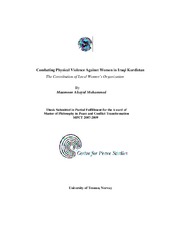Combating physical violence against women in Iraqi Kurdistan : the contribution of local Women’s Organization
| dc.contributor.advisor | Flaskerud, Ingvild | |
| dc.contributor.author | Alsayid Mohammed, Maamoon Abdulsamad | |
| dc.date.accessioned | 2009-08-27T12:02:19Z | |
| dc.date.available | 2009-08-27T12:02:19Z | |
| dc.date.issued | 2009-04 | |
| dc.description.abstract | Peace researchers aim to reduce violence “by analyzing different types of violence and its causes, predicting in order to prevent, and acting preventively and curatively”(Galtung 1996:50). This thesis addresses the issue of physical violence against women in contemporary Iraqi Kurdistan. Violence against women in Iraqi Kurdistan can be defined as structural violence, cultural violence and direct violence. The project introduces and discusses the strategies and measures implemented to combat the violence against women. In particular, I discuss the work done by local women’s organizations and international non-governmental organizations (NGOs), and analyze their roles in improving the status of women and in ending violence against women. A central issue to discuss is the role of women’s agency in a society characterized by patriarchal structures, in which the social roles of women submit to customary codified tribal systems that naturalize the idea that women are inferior. Through concepts developed in social theory, I will discuss different challenges and solutions to violence against women in Iraqi Kurdistan. How can women’s organizations contribute to free women from structural violence? What are their aims and objectives? What do they perceive as challenges? With whom do they collaborate? Which factors inhibit female victims in seeking help? In addition to women’s organizations, the government is involved in combating violence against women. What are the challenges facing the government in ending the violence? What is impeding government success? The outcomes of this work are encouraging, despite strong socio-cultural barriers. The theories and practices that may alleviate women’s suffering and lead to their empowerment have come to the fore. Women’s organizations have achieved important progress, and they have the potential for more. The findings suggest that local women’s organizations and international NGOs know that combating violence against women presupposes “conscientization”. This “critical consciousness” cannot be imposed on people, and it does not come from outside. But it can be developed through dialectical interaction and start within citizens who are in “limit-situation” which, according to Pinto, are the boundaries where all possibilities begin (Vieira Pinto in Freire 2003:99). | en |
| dc.format.extent | 18587 bytes | |
| dc.format.extent | 755867 bytes | |
| dc.format.mimetype | image/jpeg | |
| dc.format.mimetype | application/pdf | |
| dc.identifier.uri | https://hdl.handle.net/10037/2054 | |
| dc.identifier.urn | URN:NBN:no-uit_munin_1806 | |
| dc.language.iso | eng | en |
| dc.publisher | Universitetet i Tromsø | en |
| dc.publisher | University of Tromsø | en |
| dc.rights.accessRights | openAccess | |
| dc.rights.holder | Copyright 2009 The Author(s) | |
| dc.subject.courseID | SVF-3901 | nor |
| dc.subject | Violence against women | en |
| dc.subject | Social change | en |
| dc.subject | Women organization | en |
| dc.subject | Women's rights | en |
| dc.subject | VDP::Social science: 200::Social anthropology: 250 | en |
| dc.title | Combating physical violence against women in Iraqi Kurdistan : the contribution of local Women’s Organization | en |
| dc.type | Master thesis | en |
| dc.type | Mastergradsoppgave | en |


 English
English norsk
norsk


